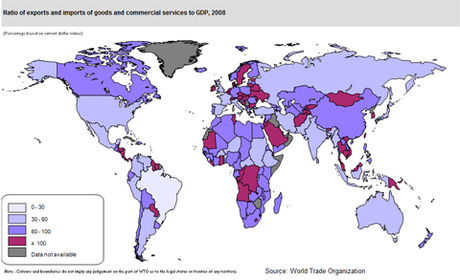
Sergio Daga was part of the CIPE-Atlas Corps Think Tank LINKS Fellowship, and served at the Heritage Foundation.
Countries trade with each other because trading typically makes a country better off. In international trade competition occurs at the firm level, while citizens of every country can benefit from free trade. Citizens enjoy a greater variety of goods and services, and generally at a lower cost.
Imagine a country that decides to isolate itself economically from the rest of the world. In order to survive, the citizens of this country would need to grow their own food, make their own clothes and build their own houses. However, if this country decided to open its border to trade, its citizens would specialize in the activities they do best. Specialization leads to higher productivity, higher income, and better living standards.
Can every country benefit from free trade? A fundamental principle of economics – comparative advantage – holds that when a country produces more of one product, it will create less of some other product. This trade-off occurs because resources are scarce and societies want to get the maximum benefit from them.
The central question in international trade is not how much it costs, in either money or resources, to produce goods such as T-shirts or computers in one country compared to another. The question is how many T-shirts it costs to produce a computer when resources are shifted from producing one product to another. The country that can produce more computers by, say, forgoing production of 1,000 T-shirts can benefit from trading with the country that gets fewer computers in return for not producing 1,000 T-shirts. In order words, countries benefit from free trade because of their comparative advantages, which means that there is no a single country in the world that can produce everything more cheaply than others.
The benefits of comparative advantage are particularly important to developing nations. In Thomas Sowell’s Basic Economics, he quotes an unattributed statement: “Comparative advantage means there is a place under the free trade sun for every nation, no matter how poor, because people of every nation can produce some products relatively more efficiently than they produce other products.” The relationship between trade openness and economic growth has been thoroughly analyzed, and the findings in most papers support the notion that greater openness to trade generates positive growth effects.
In a seminal paper Dr. Sebastian Edwards of UCLA finds that countries that liberalize their international trade and become more open – in the sense of lower tariff and nontariff barriers to trade– will tend to grow faster, especially in the developing world. In a country-specific study for Turkey, Utkulu and Özdemir (2004) find that a positive correlation between trade liberalization and economic growth is plausible. Moreover, their most important finding is that a reduction in trade distortions is linked to growth, highlighting the importance of trade policy on the economic performance of that country.
Most recently Antonio Bojanic (2012) analyzed the relationship between economic growth and trade openness with annual time-series data for Bolivia during the 1940-2010 period, the first study that covers seventy years in that country. The results show that there is indeed a long-run equilibrium relationship between economic growth and trade openness, and that causality runs from trade liberalization to economic growth. The policy implications of these findings are particularly relevant today, as the current government in Bolivia is trying to revert many of the reforms that were painfully implemented during the 1980s and 1990s.
If greater openness to the outside world is as important to influencing economic growth as this study demonstrates, then current attempts to close the economy such as the unwillingness to sign free trade agreements, rejection of government permits allowing agriculture producers to export, and the increase in textile tariffs to protect the newly state-owned textile enterprise, do not seem reasonable. Hence, sooner or later, the repercussions of such ill-advised policies will be reflected in Bolivia’s economic growth.
In conclusion, a country gains from international trade regardless of whether it is big or small, close to the equator or to the poles. Every country will benefit from trade because every nation can produce some products relatively more efficiently than they produce other products. And this is especially true for developing countries.
CIPE Atlas Corps Think Tank LINKS Fellowship brings talented young professionals with strong research backgrounds to shadow researchers and experts at leading U.S. think tanks for six month. Sergio Daga was part of the inaugural class, and served at the Heritage Foundation as Visiting Senior Policy Analyst for the Index of Economic Freedom in Latin America.

